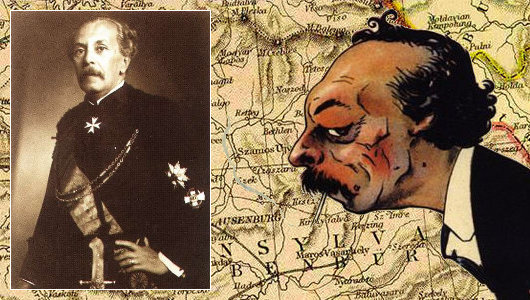
About Andrew Cusack
 Writer, web designer, etc.; born in New York; educated in Argentina, Scotland, and South Africa; now based in London.
Writer, web designer, etc.; born in New York; educated in Argentina, Scotland, and South Africa; now based in London. read more
News
Blogs
Reviews & Periodicals
Arts & Design
World
France
Mitteleuropa
Knickerbockers
Argentina
The Levant
Africa
Cape of Good Hope
Netherlands
Scandinavia
Québec
India
Muscovy
Germany
Academica
‘The Tolstoy of Transylvania’

In his column in the Daily Telegraph, former editor Charles Moore praises Miklos Banffy as ‘the Tolstoy of Transylvania’. Ardent Banffyites like myself are always pleased when the Hungarian novelist gets attention in the English-speaking world, which happens all too rarely. I can’t remember how on earth I stumbled upon the works of Banffy, probably through reading the Hungarian Quarterly, a publication that — covering art, literature, history, politics, science, and more — is admirably polymathic in our age in which the specialist niche is worshipped.
To put it simply, Banffy is a must-read. If you love Paddy Leigh Fermor’s telling of his youthful walk from the Hook of Holland to Constantinople (the third and final installation of which we still await), then Miklos Banffy will be right up your alley. Start with his Transylvanian trilogy — They Were Counted, They Were Found Wanting, and They Were Divided.
The story follows two cousins, the earnest Balint Abady and the dissolute László Gyeroffy, Hungarian aristocrats in Transylvania, and the varying paths they take in the final years of European civilization. The novels “are full of love for the way of life destroyed by the First World War,” Charles Moore points out, “but without illusion about its deficiencies.”
Three volumes of nearly one-and-a-half thousand pages put together, they make for deeply, deeply rewarding reading, transporting you to the world that ended with the crack of an assassin’s bullet in Sarajevo, 1914.
After finishing his trilogy, Banffy’s autobiographical The Phoenix Land is worthwhile; some of the real events depicted shadow those in the fictional novels. As previously mentioned, it contains a description of the last Hapsburg coronation (that of Blessed Charles) and numerous amusing tales.
After that, I’m afraid you will have to learn Hungarian, which I have neglected to do, as no more of this author’s oeuvre has yet been translated into English.
Search
Instagram: @andcusack
Click here for my Instagram photos.Most Recent Posts
- Teutonic Takeover March 10, 2025
- Katalin Bánffy-Jelen, R.I.P. March 3, 2025
- Substack Cusackiensis March 3, 2025
- In the Courts of the Lord February 13, 2025
- American Exuberant February 10, 2025
Most Recent Comments
Book Wishlist
Monthly Archives
Categories



This is entirely unrelated to this subject.
I am wondering if you, as a young man of erudition and sophistication, would give us your comments on the notorious Mrs Iris Robinson of Belfast?
I have no comments to give on that subject.
Thank you for this post; I was just bemoaning my lack of familiarity with Hapsburg literature.
There are more Hapsburgian writers than Banffy (who was a Protestant after all). Joseph Roth, for example (an Austrian Jewish Catholic), known for his novel The Radetzky March.
Dear Andrew,
Unfortunately we cannot see the comments properly.
Thanks, Juan
A caveat: the old order did not end with the assassination of Archduke Francis Ferdinand, as deplorable and catastrophic an event as that was. It ended with the defeat of the Central Powers.
Had they won, then the old order would have continued right up until today. No Hitler, no Stalin, no Labour governments in Britain, a likely restoration of the monarchy in France; the list is endless.
Dear Andrew Cusack,
This is my first reading of your blog – well done – it’s both fascinating and entertaining.
I know a devout Cathoic in London, the city in which I reside. This ‘devout Catholic’ speaks fluent Hungarian. The Hungarian government commended him for his fluency. I will give him the word about this blog post ‘next time I see him in Corpus Christi.
I give my salute and thanks for the post of Baron von Hetterscheidt, whom pensées are completely in conformity with mines. I’m glad to read that, because such énoncés are so few written on public pages. Sorry for my bad english.